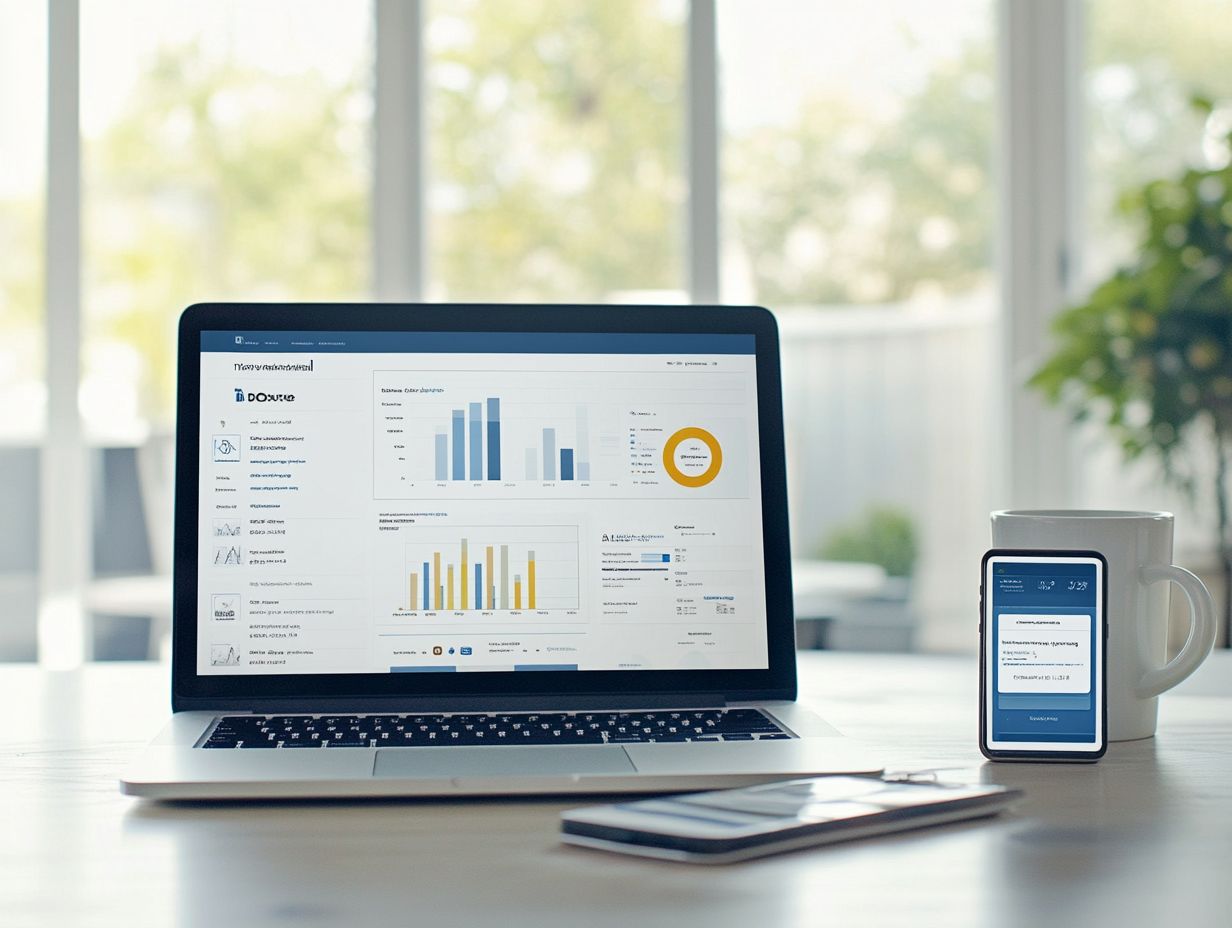Essential CRM Features to Consider During Setup
In today s fast-paced business world, a Customer Relationship Management (CRM) system is crucial. It helps nurture strong client relationships and optimize operations.
This article explains what a CRM is. You’ll learn its importance for your business and key features for setting it up, including customization options, integration capabilities, and crucial security measures.
We ll assist you in selecting the right CRM tailored to your specific needs. Discover how a well-chosen CRM can transform your business and boost your bottom line!
Contents
- Key Takeaways:
- What is a CRM and Why is it Important?
- Key Features to Consider During Setup
- How to Choose the Right CRM for Your Business
- Best Practices for Implementing a CRM
- Frequently Asked Questions
- What are Essential CRM Features to Consider During Setup?
- Why is Contact Management an Essential CRM Feature?
- How Does Lead and Opportunity Tracking Benefit Businesses?
- What Role Do Reporting and Analytics Play in CRM?
- How Can Email Marketing Help Businesses with Customer Relationship Management?
- Why are Integrations Important for CRM?
Key Takeaways:

Customization options are essential for tailoring your CRM to fit the specific needs of your business. This allows for a more efficient and personalized experience.
Integration capabilities are crucial for streamlining processes and centralizing data, improving the overall efficiency and accuracy of your CRM system.
Reporting and analytics allow you to track and measure the success of your CRM, providing valuable insights for informed business decisions and improvements.
What is a CRM and Why is it Important?
Customer Relationship Management (CRM) software is an essential asset for today s businesses. It is designed to make managing interactions easier and helps sales teams efficiently manage customer data.
With a CRM, you can automate lead management and elevate your marketing campaigns through seamless integration tools. This improves business processes and performance.
CRM provides invaluable insights into customer behavior, enabling you to tailor your offerings and create a more personalized customer journey.
Definition and Benefits of a CRM System
A CRM system consolidates your customer data, streamlining the lead management process while enhancing sales efforts through powerful automation tools.
This robust solution allows you to track interactions, manage contacts, and analyze customer behavior effortlessly.
With features like personalized communication and automated follow-ups, you can significantly boost the efficiency of your lead management.
It nurtures better customer relationships by providing insights into their needs and preferences, allowing you to craft tailored marketing strategies.
As your teams collaborate on a unified platform, the likelihood of closing deals rises, ultimately driving revenue growth and fostering long-term customer loyalty.
You can analyze metrics and trends to make data-driven decisions that elevate overall business performance.
Key Features to Consider During Setup
When setting up a CRM software solution, assessing key features to compare in CRM software that enhance functionality and user experience is crucial.
Focus on aspects like customization options, integration capabilities, and comprehensive reporting and analytics tools. Don’t overlook these features! They are essential for maximizing your CRM’s potential.
Customization Options
Customization options in CRM software enable you to tailor the platform to fit your unique workflows. By leveraging customizable templates and client profiles, you can significantly enhance the user experience.
Adjusting these elements ensures that your CRM aligns perfectly with your specific processes, highlighting key features in enterprise CRM systems that make it easy to track interactions and manage relationships.
Defining user permissions within the CRM fosters seamless collaboration across teams while safeguarding sensitive information.
Moreover, workflow automation streamlines operations, allowing your sales and support teams to focus on high-value tasks instead of getting bogged down with administrative duties.
This combination of personalized features boosts productivity and cultivates a more cohesive work environment, ultimately driving better client engagement.
Ready to elevate your business? Let s find the perfect CRM for you!
Integration Capabilities

The integration capabilities of CRM software are crucial for enabling seamless connections with third-party tools like email clients, social media platforms, and other vital business applications.
These functionalities not only streamline your workflows but also elevate the overall data-sharing experience across various platforms.
For example, email integration allows your team to track client interactions directly within the CRM, giving you a comprehensive view of customer engagement.
Social media connectivity opens fresh avenues for outreach, enabling you to gather real-time insights into customer preferences and behaviors. These connections improve communication, ensuring that you can address customer queries promptly and effectively ultimately leading to increased satisfaction and loyalty.
By using these integration tools, you can cultivate a cohesive environment that fosters collaboration and drives targeted marketing efforts.
Reporting and Analytics
The reporting and analytics features in CRM software provide essential data analytics tools and intuitive reporting dashboards that are vital for tracking your sales metrics and performance indicators.
These tools enable you to monitor key performance indicators such as lead conversion rates, customer acquisition costs, and average deal size.
You can spot opportunities for growth by analyzing trends in your sales data! This information at your fingertips helps you make informed strategic decisions that enhance your business.
Sales forecasting plays a crucial role in this analytical landscape, helping you predict future sales trends based on historical data. This insight lets you allocate resources wisely, helping you stay ahead of the competition!
Mobile Accessibility
Mobile accessibility is a game-changer in CRM software, allowing you to manage customer interactions and tasks effortlessly while on the move with mobile CRM solutions.
This flexibility means you can respond swiftly to client inquiries and updates, creating a more agile sales process. By harnessing features like real-time data updates and customizable dashboards, you can remain informed and connected, no matter where you are.
The effect on customer engagement is significant; you gain instant access to vital information and customer history, ensuring that every interaction is meaningful and fosters trust and loyalty.
Streamlined task management functions further boost your productivity, allowing you to prioritize your efforts effectively, ultimately driving sales performance and enhancing client satisfaction.
Security Measures
Implementing robust security measures in your CRM software is absolutely essential for protecting sensitive customer data and ensuring compliance with data protection regulations.
You must prioritize user permissions and data encryption, as these elements are crucial for limiting access to authorized personnel only.
By setting strict user roles, you can effectively prevent data leaks, ensuring that employees access only the information necessary for their job functions. Data encryption acts as a frontline defense, rendering customer information unreadable to unauthorized individuals.
Recent data breaches show the importance of strong security measures. Hackers often exploit weak permissions, resulting in the exposure of millions of customer records. This not only incurs severe financial penalties but also leads to devastating consequences for customer trust.
How to Choose the Right CRM for Your Business
When selecting the ideal CRM software for your business, assess your unique needs carefully to find the perfect CRM for your business!
Take the time to research a variety of CRM options that harmonize with your sales process and effectively incorporate customer feedback.
This thoughtful approach ensures that you find a solution perfectly tailored to elevate your operations and enhance customer relationships.
Start researching today to find the CRM that will transform your business!
Evaluating Your Business Needs

Evaluar las necesidades de su negocio es el primer paso crucial para seleccionar el software de gesti n de relaciones con los clientes (CRM) adecuado. La soluci n elegida debe alinearse perfectamente con su proceso de ventas y gestionar de manera efectiva las interacciones con los clientes.
Para iniciar esta evaluaci n, t mese el tiempo para realizar un an lisis exhaustivo de sus flujos de trabajo actuales y estrategias de ventas. Involucre a miembros del equipo de diferentes departamentos para identificar puntos dolorosos y reas propensas a la mejora.
Comprender sus objetivos clave de interacci n con el cliente agudizar su enfoque sobre qu caracter sticas del CRM son vitales para cultivar relaciones m s s lidas. Esto incluye automatizaci n, an lisis o herramientas de comunicaci n.
La escalabilidad debe estar en el centro de su toma de decisiones. Optar por una soluci n CRM que pueda crecer junto a su negocio asegura que sus necesidades en evoluci n se satisfagan sin problemas.
Researching and Comparing CRM Options
Researching and comparing various CRM options is essential for finding a solution tailored to your specific needs. Pay special attention to must-have add-ons for your CRM software, connections with other tools you may use, user reviews, and pricing.
Begin by scrutinizing the features that hold the most significance for you, such as automation capabilities and reporting tools. Then, read user testimonials to gain valuable insights into real-world experiences.
Evaluate different pricing models. Some options have flat rates, while others offer tiered pricing or pay-as-you-go structures. Understanding these factors will help you stay within your budget.
Best Practices for Implementing a CRM
Implementing a CRM software solution with precision demands your commitment to best practices, especially in training and onboarding. It’s vital to keep a close eye on your success metrics to ensure you re hitting your targets!
Training and Onboarding Processes
Effective training and onboarding processes are crucial for your CRM software adoption. They ensure that your sales teams can maximize its features and manage user permissions with finesse.
To craft robust training programs, implement hands-on workshops that allow your employees to engage with the CRM tools using real-life scenarios. These interactive sessions provide the perfect opportunity to tackle specific challenges.
Ongoing support, such as access to a dedicated help desk or regular check-in sessions, enables your team to seek assistance whenever needed.
When your employees feel confident in their CRM skills, they can harness these powerful tools to organize customer relationships, streamline communication, and ultimately boost overall productivity.
Monitoring and Measuring Success
Monitoring and measuring success after implementing CRM software is crucial for grasping its effectiveness, particularly when focusing on sales metrics and performance indicators.
Regular assessments act as benchmarks, allowing you to evaluate how well the CRM system aligns with your goals. By analyzing key sales metrics like conversion rates, average deal size, and customer retention rates, you can identify areas requiring improvement.
Gathering customer feedback through surveys and direct interactions offers invaluable insights into user satisfaction. This comprehensive approach refines your sales strategies and ensures that the CRM remains a dynamic tool tailored to your business needs.
Frequently Asked Questions

For more information on how CRM solutions can enhance your business, contact us today!
What are Essential CRM Features to Consider During Setup?
Unlock your potential with powerful CRM features! Understanding the key considerations for multi-location CRM setup is essential, as these important tools help businesses manage customer relationships and boost sales.
- Contact Management
- Lead and Opportunity Tracking
- Reporting and Analytics
- Email Marketing
- Integrations with Other Tools
Why is Contact Management an Essential CRM Feature?
Contact management allows businesses to store and organize all customer information in a single place. It simplifies tracking interactions, preferences, and purchase history.
This feature is a game-changer for businesses, providing a comprehensive view of each customer and their relationship with the company.
How Does Lead and Opportunity Tracking Benefit Businesses?
Lead and opportunity tracking helps businesses monitor potential customers and their progress through the sales pipeline.
By keeping track of leads, businesses can identify areas for improvement, prioritize opportunities, and optimize their sales process effectively.
What Role Do Reporting and Analytics Play in CRM?
Reporting and analytics provide valuable insights into customer data. By analyzing sales performance and customer behavior, businesses can make informed decisions.
These features can significantly enhance strategy and performance.
How Can Email Marketing Help Businesses with Customer Relationship Management?
Email marketing enables businesses to communicate with customers through targeted and personalized campaigns.
These campaigns nurture relationships, promote products, and drive sales, making email marketing an essential CRM feature.
Why are Integrations Important for CRM?
Integrations are crucial as they connect your CRM system with various tools, such as marketing automation and social media platforms.
This seamless integration improves overall efficiency and effectiveness in managing customer relationships.
Explore CRM solutions that fit your needs, and take your business to the next level!






